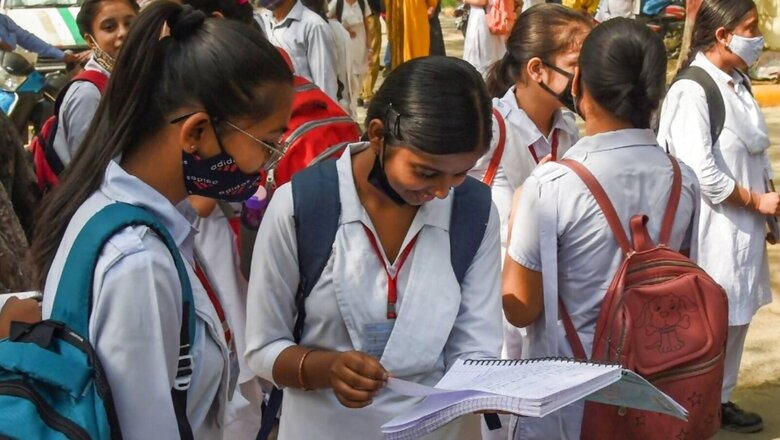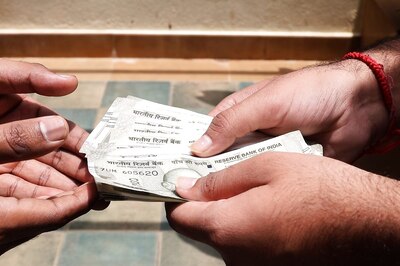
views
Two years since the launch of National Education Policy (NEP) 2020 and it has had its fair share of controversies. Right from regional languages versus English, to universities and colleges allegedly inclining toward Hinduism, the launch of the new initiatives has met with opposition.
Even as all of the changes suggested under the policy are yet to be launched, schools claim more still needs to be done for a complete overhaul. Even after two years of its launch, about 70 per cent of the schools claim that they are not fully prepared to implement the policy and still have lot of work to do.
Also read| NEP Makes Mockery of Education System: Section of Academicians
The new NEP approved by the Union Cabinet in 2020 and launched on July 29 of that year, had replaced the 34-year-old National Policy on Education framed in 1986. On this occasion, let us look back at the controversies related to NEP 2020 so far:
Emphasis on regional language, 3 language policy: The NEP 2020 states that wherever possible, the medium of instruction must in the mother tongue or local languages. This must be done until at least class 5, but preferably till class 8. Punjab government had made the Punjabi language compulsory for all students in the state, from classes 1 to 10. Schools which do not follow the same will be fined up to Rs 2 lakh for violation of the order.
Similarly, Maharashtra has made Marathi compulsory from classes 1 to 10 in all schools including govt schools, private non-state board schools, CBSE and CISCE. Telangana has made Telugu mandatory till class 9 and Andhra Pradesh gives lessons in Telugu in schools till class 10. Karnataka govt made Kannada compulsory not only in primary and secondary schools but also in degree-level classes.
This has created disappointment among parents and students who are especially in private schools, whose preferred language is English.
Further, AICTE plans to offer degree courses such as engineering and law in regional courses in Hindi, Tamil, Marathi, Bengali, and Telugu. The move was introduced as students from unprivileged backgrounds are left out or have difficulty following in English. But there is a debate that whether this would help one get jobs as more employers put focus on English when it comes to recruitment.
Hinduism in schools and college courses: The NEP puts emphasis on Indian culture, however, many believe that it can influence the curriculum towards one religion more than others. Ever since the launch of NEP, several states have added Bhagavad Gita to their school curricula. Gujarat education minister Jitu Vaghani added the Bhagavad Gita as a part of the school syllabus for classes 6 to 12 from the academic year 2022-23.
Karnataka’s Education Minister BC Nagesh also said the Bhagavad Gita will be taught in schools across the state from the new academic session. “Moral education is the need of the hour and hence, stories from Ramayana and Mahabharata which help to inculcate moral qualities will be included in the syllabus,” Nagesh said.
Even the Uttarakhand government also included Bhagavad Gita, Vedas, and Upanishads in the school curriculum. Uttarakhand education minister Dhan Singh Rawat said that the implementation of religious texts in the syllabus will for the upcoming academic year.
Not just schools, some colleges have introduced relevant courses. Maharaja Sayajirao University of Baroda, Gujarat University, BHU have launched degree courses in Hinduism.
Many academicians claim that the NEP talks about inclusivity and does not favor any particular religion and it is being misinterpreted. The NEP suggests revamping the curriculum and making it in context with technology as well as Indin culture.
Students, and academicians against FYUP: The policy includes reformation of the 3-year undergraduate studies structure and making it 4-year courses now. Under the new norm, general BA, BCom, and BSc programme will be scrapped. FYUP allows students the option of multiple entry and exits, meaning students who leave after a certain time period will get the corresponding certification. For instance, those who wish to leave after a year will get a certificate while those who leave after two years will get diploma, etc. Delhi University is set to introduce FYUP from this academic year.
This, however, has received a lot of criticism. Students launched several protests all across the country claiming the restructuring in the study programmes will lead to “dilution of courses and degrees.” The Federation of Central Universities Teachers Associations said that the policy will reduce the role of teachers and worsen the relation between teachers and pupils. Academicians say this will increase the cost of obtaining an undergraduate degree making it beyond the reach of marginalised students. According to a survey conducted in 2013, students have to spend close to Rs 1.5 – Rs 2 lakhs per year in staying in Delhi to receive their education, if FYUP is introduced.
Read all the Latest News and Breaking News here

















Comments
0 comment